Monopoly Meaning In Economics: A monopoly market is where there is only a single seller in the market with no presence of substitutes.
There are many reasons for which the firm gains monopoly power, such as:
- Government license
- ownership of resources
- copyright
- patent
- high starting cost
These factors also become a restriction for new firms to enter the industry.
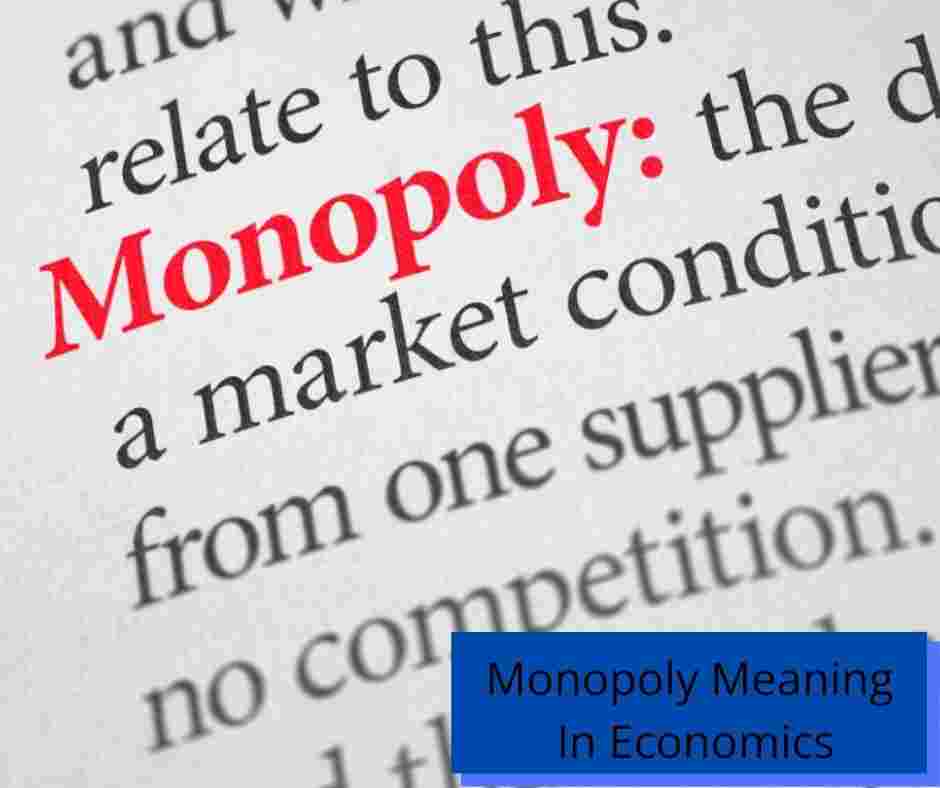
Monopoly is the solo firm in the industry, so a monopoly firm is equalled to an entire industry. In other words, a monopoly firm is making the entire industry. These firms are price maker and enjoy the position of profit maximization.
What Is Monopoly In Economics?
Monopoly meaning in economics can be illustrated as the form of market structure where there are a single seller and multiple buyers, and the seller has control over the price and they enjoy maximum profits.
Definition Of Monopoly In Economics
Definition: A firm that is the only seller and sells a unique product in the market is called a monopoly firm and this form of market structure is called a monopoly market. Since there is a single seller in an industry their is no availability of a close substitute.
Features of Monopoly Market
Monopoly market structure features differ from the other forms of market. For the better elaboration of monopoly meaning in economics, here are the characteristics of the monopoly market:
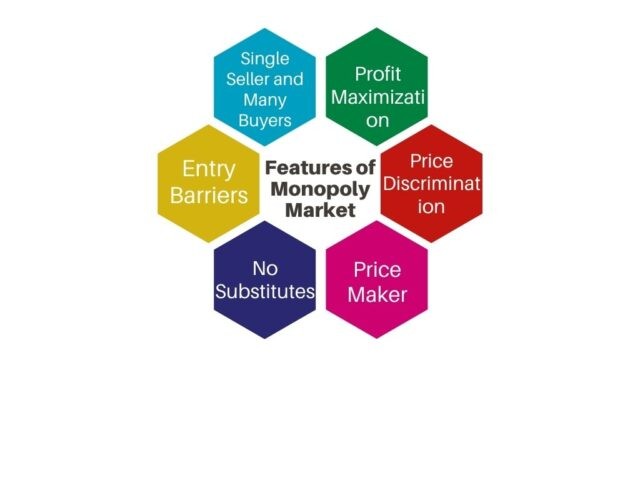
Single Seller and Many Buyers
A monopoly firm is a single seller or producer in an industry. A monopoly firm comprises the whole industry, as they are the sole sellers in the market. Hence, a monopoly firm is also called an industry.
Entry Barriers
The reason which give the rise to the monopoly is the same which restricts the new firms to enter the market. Such things are:
- Government license
- ownership of resources
- copyright, patent
- high starting cost
This is the primary feature of a monopoly market and elaborates on the monopoly markets in economics.
No Substitute
Because of no availability of close substitute products in the market firms can achieve a monopoly in the market. Firms have the whole or the maximum market share due to a single seller in the industry. As a result, consumers do not have multiple options to choose their product.
Monopoly firms own the entire market which makes them the price maker of the industry.
Price Maker
As the firm is the single seller and there are no substitutes in the market, which gives the firm power called ‘monopoly power’. Due to this firm can make and charge their prices, which creates the firm as a ‘price maker’. Therefore, firms have the power to set prices as their desires.
Being the price maker of the industry is their basic feature because it is the primary reason for its profits and equilibrium. It will give a more elaborate explanation of monopoly meaning in economics.
Price Discrimination
Because of being a price maker of the industry, firms can charge different prices from people which is called ‘price discrimination’ in pricing under monopoly. Moreover, monopoly firms have the power to charge different prices from different customers for the same quantity of product.
Profit Maximization
Practices like price maker and price discrimination in monopoly firms give rise to profit maximization in these firms. Prices are formed by the firm which are the desired prices of the owners. Plus, due to the absence of substitutes in the market, monopoly firms can enjoy profit maximization for a long period.
These features of the monopoly market have described the monopoly meaning in economics and monopoly characteristics.
Types Of Monopoly Meaning In Economics
Monopoly is categories into different types which gives monopoly meaning in economics more profound meaning. Every type of monopoly has a separate reason for its existence. Here are five different types of monopoly markets:
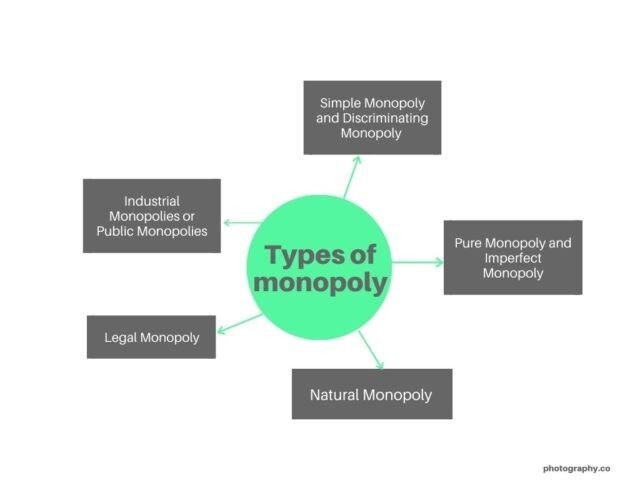
Simple Monopoly and Discriminating Monopoly
A firm that is charging uniform or similar prices for its products and services is called a simple monopoly. It works in one market
On the other hand, discriminating monopoly firms charge a different price for the same quantity from different consumer. It operates in more than one market.
Pure Monopoly and Imperfect Monopoly
Monopoly firm which controls all the supply of products as well as related things such forms of market structure is called a pure monopoly. They enjoy more monopoly power as compare to another type of monopoly.
A pure monopoly firm has absolute monopoly power. It is a very rare monopoly.
An imperfect monopoly firm has a limited degree of power. In an imperfect monopoly, a firm produces a product, with the presence of close substitutes in the market.
Natural Monopoly
There can be natural causes for establishing a monopoly market, this type of monopoly is called a natural monopoly.
Mica in India, nickel production in Canada are good examples of natural monopoly.
This monopoly came naturally to these countries. This type of monopoly gives a different outlook to monopoly meaning in economics differently.
Legal Monopoly
The monopoly which emerged because of any legal provisions like copyrights, patents, trademarks etc is called a legal monopoly. because of different laws in countries, nobody can copy the designs which are registered under one brand name, patent or trademark. It safeguards the interest and work of people.
Industrial Monopolies or Public Monopolies
This monopoly is created by the government by restricting privates sector entry in some industries For example, The Industrial Policy Resolution 1956, in India, restricts private industry involvement in some industries like arms and ammunition, atomic energy, railways. That means these industries will have a public monopoly of the Central Government. And, the industrial monopolies are created by statutory measures.
These five types of a monopoly market, which illustrates the monopoly meaning in economics.
Equilibrium In Monopoly Firm
The equilibrium of the monopoly market is categorized into short-run and long-run. Understands the levels of equilibrium in the short and long run the and type of profit firms can earn to elaborate monopoly meaning in economics.
Short-Run Equilibrium in Monopoly Firm
Short-run is a certain period in the future. In that case, at least one input is fixed and other inputs are variable. Understand the monopoly meaning in economics by explaining the short-run equilibrium of a monopoly firm.
Similar to perfect competition, a monopoly firm also has three possibilities for a firm’s equilibrium in monopoly. Which are:
- In Case of normal profits – average cost(AC) = average revenue(AR)
- In the case of supernormal profits – average cost(AC) <average revenue(AR)
- In case of losses – average cost(AC) > average revenue(AR)
Normal Profits
Monopoly meaning in economics: It is said normal profits when the AC(average cost) of production is equal to the AR(average revenue) for the corresponding output.
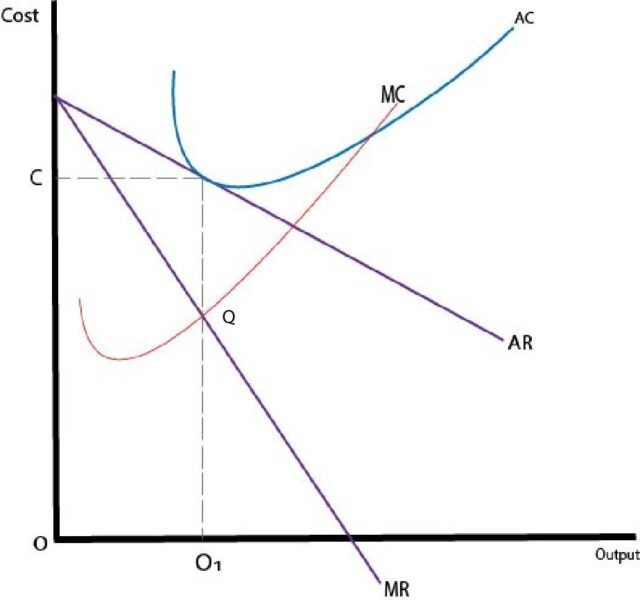
- The firm is said to be equilibrium when MC= MR which is point Q in the above graph.
- At the point corresponding to Q, the AC curve touches the AR curve.
- Therefore, the firm earns normal profits.
Super-normal Profits
When AC is less than the AR for the corresponding output, in this situation firm will earn super-normal profits.
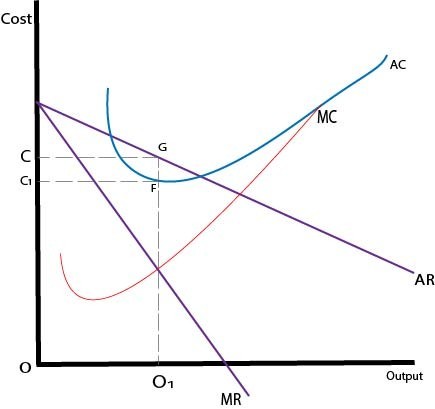
- In the above figure, the price per unit = OC = O1G.
- Also, the cost per unit = OC1. It means, the firm is earning huge profits and they have a small cost of production.
- In supernormal profit, per-unit profit equals the OC – OC’ = CC’
Losses
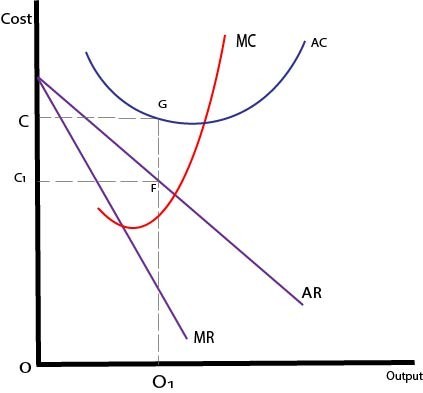
When AR < AC in that case firm will have to suffer loss.
- For the same quantity, the AC curve is above the AR curve.
- AR = OC and the AC=OC’.
- Because of this firm is facing an average loss which equals CC,’ and the total loss is shown as CC’GF.
- Sometimes monopoly firms set lower prices faces losses so that new firms cannot enter the market.
Now, understand monopoly meaning in economic equilibrium in the long-run.
Long-Run Equilibrium Under Monopoly
Next topic in monopoly meaning in economic, the equilibrium point of monopoly firms in the long-run.
The monopoly industry has barriers to the entrance of new-firms into the market. These entry barriers are because of control on raw materials used in the industry. The firm might have a patent, or the market of the goods is limited.
If the case new firm tries to enter the industry lowers ower down its prices goods to such an extent that a firm will start to incur losses.
When there is no threat from new firms, a monopoly firm makes long-run adjustments in the plant’s scale.
In the situation of large market size and expansion. A monopoly firm will produce big amounts of goods at the lowest cost. But, their supernormal profits in long The long-run equilibrium of a monopoly firm is illustrated in the graph below:
Monopoly meaning in economics by Diagram/Curve
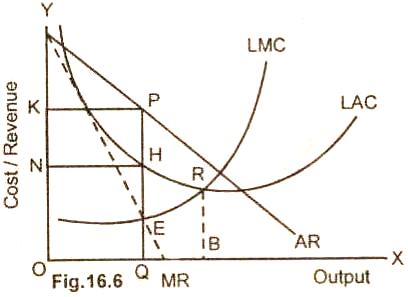
- In the case of long-run factors of production are variables.
- Long-run marginal cost (MC)= marginal revenue (MR), and the LMC cuts the MR curve from below is the state when firms earn the max profit
- In the above graph, a monopoly firm’s equilibrium is at point E.
- LMC intersects the MR curve. This means, QP is the equilibrium price, and OQ is the equilibrium output.
- OQ level of output, generates the cost which is QH (LAC). And, HP represents the per unit super-normal profit. Therefore, the total super-normal profit is KPHN.
- LAC is not minimum at OQ.
By now, a monopoly meaning in economics is explained by its equilibrium. Now, understand the advantages part of the monopoly meaning in economics.
Advantages Of Monopoly
Here are advantages of monopoly firms, for our better understanding on topic monopoly meaning in economics:
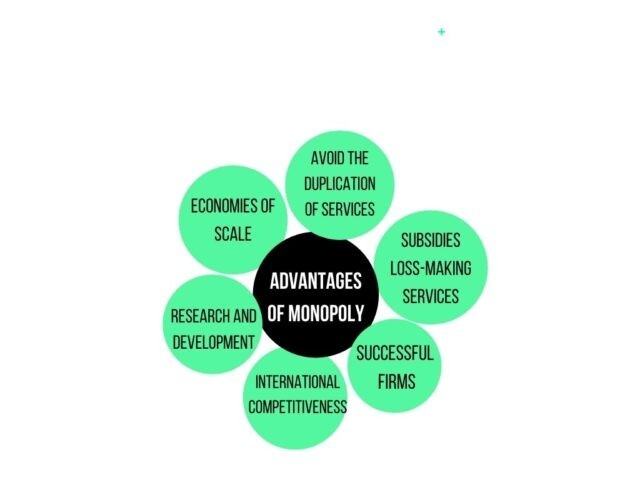
Economies of scale
The cost of production starts to decrease with the increase in the level of production, which makes the price of the product also lower and affordable for consumers. industries like mineral water, steel production have a high fixed cost. So, in this case, it is beneficial to have a low variable cost.
Research and development
There is a huge cost which is spent on research and development to keep the cost of the product effective. Therefore, it becomes an important part of many industries, for example, aircraft manufacturing, pharmaceuticals, telecommunication. Developing medicines have a huge risk, but monopoly profits give sufficient support to take the risk.
International competitiveness
A monopoly firm enjoys its power in its home country, but in some cases, firms face global competition. Like, British Steel enjoys having a domestic monopoly. But, at the global level, they have huge competition. Domestic monopoly becomes the competitive edge in global competition. Monopoly is not always as same as it is in one country. Monopoly meaning in economics has differed in different countries.
Successful firms
Consistency also gives the firm a monopoly position. Firms success can also create monopoly power. One of the best examples is ‘Google’. It has created a monopoly by being the most dynamic algorithm for search engine.
Subsides loss-making services
Monopoly firms make another big use of super-normal profits in subsidizing socially useful but loss-making services. For example metro in India charges higher prices during office hours due to this metro subsidize the prices during odd timing- at night or early morning.
Avoid the duplication of services
Some firms gain monopoly power by being the most hardworking firm in the industry. Let’s suppose the example of neighbourhood grocery stores. One store is more efficient and dynamic. Which results in the loss of other stores in the area. And, a monopoly of one store in a neighbourhood
These advantages of a monopoly market illustrate the monopoly meaning in economics and its benefits to the economy.
Disadvantages of Monopoly
A monopoly market is not always good for the economy. Monopoly meaning in economics have some disadvantages, which are:
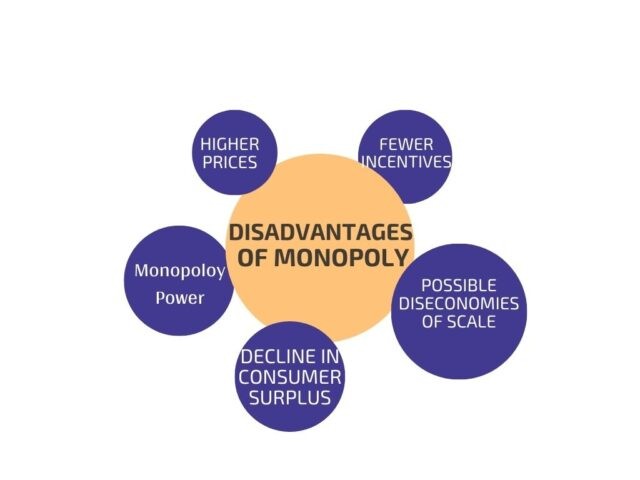
Higher prices
There is a presence of inelastic demand in the case of monopoly which can create an increase in prices. Since there are no close substitutes, forces consumers to buy the product at a higher price. For example, Microsoft increased its prices in the 1980s. This is because of the monopoly in computer software.
Decline in consumer surplus
Prices of products are high in case of monopoly because they are the sole seller and price-makers of the industries. And it was said earlier in the post about monopoly meaning in economics, that buyers face burden because of maximum profits. As a result, there are few consumers, which creates allocative inefficiency.
Fewer incentives
Due to the monopoly power firms do not have to pursue the consumers to buy the products. Sellers do not have to use promotional tools to attract consumers. Therefore it encourages x-inefficiency (organizational slack)
Possible Diseconomies of scale
When monopoly firms start to grow, firms have difficulty in handling internal operations. As a result, the firm starts going downhill and it becomes difficult to survive the business.
Monopoly power
monopoly power is also abused against suppliers. Such as, in the case of farmers and supermarket’s, due to the supermarket’s monopoly farmers faces price discrimination. Moreover, it has an impact on worker’s salaries and wages.
These are the disadvantages of monopoly to illustrate the monopoly meaning in economics, and problems related to it in the economy.
Examples of Monopoly Market
Connect the theoretical description of monopoly meaning in economics with the real world. Here are real-world monopoly examples of the world:

Indian Railway
Indian rails are an example of a legal monopoly market. The rail transportation ministry has a monopoly in rail transportation in India. It gives an understanding of monopoly meaning in economics. Indian Railways company is state-owned. Rail networks are also said as a ‘natural monopoly.’ It is because only one provider can run a train on a given track at a given time, so naturally, there cannot be competition.
Google is the leading search engine in the world, followed by Microsoft and Yahoo. The market share of Microsoft and Yahoo is very small as compared to Google. But, Google makes a maximum profit from advertising, making them 60% of the global revenue from advertising, which gives you monopoly meaning in economics. Google earns from its advertisement setup, using search history and locations. Smaller firms can’t compete with such big data.
Facebook with all its other owned social media app they have captured the 90% market share of the social media industry. It is a prominent example of monopoly meaning in economics. Mark Zuckerberg has not named all the apps, but there four apps under Facebook: Facebook app, Facebook Messenger, WhatsApp, and Instagram. Facebook-owned apps are the most common apps of social media.
Luxottica
Luxottica is the leading brand in eyewear, plus it owns the biggest brands in the industry. But, there is no change in the name of these brands, which makes the consumer believes they have different choices. This brand has a market share more of more than 80%
Microsoft
Microsoft operating systems own 90-95% of the microcomputer computer operating systems market across the globe. Its operating system becomes a basic need in home and business computers. It gave the monopoly in the domestic and IT industry. Plus, the substitutes of the operations system are not even close to Microsoft’s case.
These are the top 5 monopoly market real-world examples that clearly explain the monopoly meaning in economics.
Here was each subsection that can elaborately describe the monopoly meaning in economics. To describe the definition of Monopoly in economics.
However, there are other imperfect markets other than monopoly market like oligopoly market which is studied next in detail.